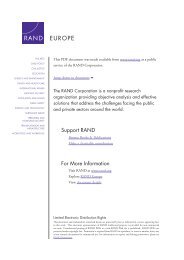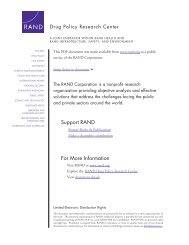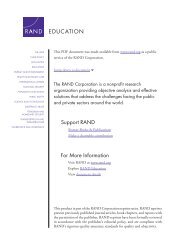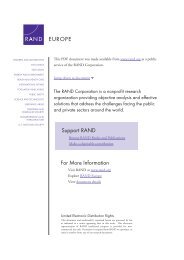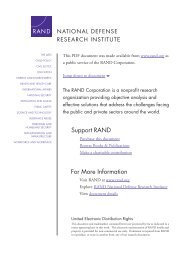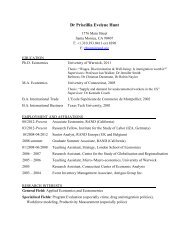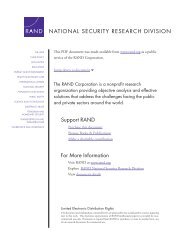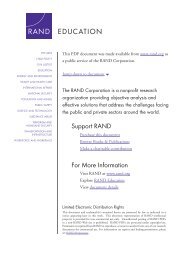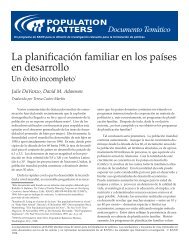- Page 1 and 2:
THE ARTS CHILD POLICY CIVIL JUSTICE
- Page 3 and 4:
Considering a Cadre Augmented Army
- Page 5:
- iii - PREFACE This dissertation e
- Page 9 and 10:
- vii - SUMMARY This dissertation c
- Page 11:
- ix - the similarities and differe
- Page 15 and 16:
- xiii - ACRONYMS Symbol AC AIT ARF
- Page 17 and 18:
-1- Introduction Introduction This
- Page 19 and 20:
-3- Introduction ability to rotate
- Page 21 and 22:
-5- Introduction In a force designe
- Page 23 and 24:
-7- Introduction increasing militar
- Page 25 and 26:
-9- Introduction peacetime have bee
- Page 27:
-11- Introduction forces. This is i
- Page 30 and 31:
-14- A Budgetary Analysis of Cadre
- Page 32 and 33:
-16- A Budgetary Analysis of Cadre
- Page 34 and 35:
-18- A Budgetary Analysis of Cadre
- Page 37 and 38:
-21- A Budgetary Analysis of Cadre
- Page 39 and 40:
-23- A Budgetary Analysis of Cadre
- Page 41 and 42:
-25- A Budgetary Analysis of Cadre
- Page 43 and 44:
-27- A Budgetary Analysis of Cadre
- Page 45 and 46:
-29- A Budgetary Analysis of Cadre
- Page 47 and 48:
-31- A Budgetary Analysis of Cadre
- Page 49 and 50:
-33- A Budgetary Analysis of Cadre
- Page 51 and 52:
-35- A Budgetary Analysis of Cadre
- Page 53 and 54:
-37- A Budgetary Analysis of Cadre
- Page 55 and 56:
-39- A Budgetary Analysis of Cadre
- Page 57 and 58:
-41- A Budgetary Analysis of Cadre
- Page 59 and 60:
-43- A Budgetary Analysis of Cadre
- Page 61 and 62:
-45- A Budgetary Analysis of Cadre
- Page 63 and 64:
-47- A Budgetary Analysis of Cadre
- Page 65 and 66:
-49- A Budgetary Analysis of Cadre
- Page 67 and 68:
-51- A Budgetary Analysis of Cadre
- Page 69 and 70:
-53- A Budgetary Analysis of Cadre
- Page 71 and 72:
-55- A Budgetary Analysis of Cadre
- Page 73 and 74:
-57- A Budgetary Analysis of Cadre
- Page 75 and 76:
-59- A Budgetary Analysis of Cadre
- Page 77 and 78:
-61- A Budgetary Analysis of Cadre
- Page 79 and 80:
-63- A Budgetary Analysis of Cadre
- Page 81 and 82:
-65- A Budgetary Analysis of Cadre
- Page 83 and 84:
-67- A Budgetary Analysis of Cadre
- Page 85 and 86:
-69- A Budgetary Analysis of Cadre
- Page 87 and 88:
-71- A Budgetary Analysis of Cadre
- Page 89 and 90:
-73- A Budgetary Analysis of Cadre
- Page 91 and 92:
-75- A Budgetary Analysis of Cadre
- Page 93 and 94:
-77- A Budgetary Analysis of Cadre
- Page 95 and 96:
-79- A Budgetary Analysis of Cadre
- Page 97 and 98:
-81- A Budgetary Analysis of Cadre
- Page 99 and 100:
-83- A Budgetary Analysis of Cadre
- Page 101 and 102:
-85- A Budgetary Analysis of Cadre
- Page 103 and 104:
-87- A Budgetary Analysis of Cadre
- Page 105 and 106:
-89- A Budgetary Analysis of Cadre
- Page 107 and 108:
-91- A Budgetary Analysis of Cadre
- Page 109 and 110:
-93- A Budgetary Analysis of Cadre
- Page 111 and 112:
-95- A Budgetary Analysis of Cadre
- Page 113 and 114:
-97- A Budgetary Analysis of Cadre
- Page 115 and 116:
-99- A Budgetary Analysis of Cadre
- Page 117 and 118:
-101- A Budgetary Analysis of Cadre
- Page 119 and 120:
-103- A Budgetary Analysis of Cadre
- Page 121 and 122:
-105- A Budgetary Analysis of Cadre
- Page 123 and 124:
-107- A Budgetary Analysis of Cadre
- Page 125 and 126:
-109- A Budgetary Analysis of Cadre
- Page 127 and 128:
-111- A Budgetary Analysis of Cadre
- Page 129 and 130:
-113- A Budgetary Analysis of Cadre
- Page 131 and 132:
-115- A Budgetary Analysis of Cadre
- Page 133 and 134:
-117- A Budgetary Analysis of Cadre
- Page 135 and 136:
-119- A Budgetary Analysis of Cadre
- Page 137 and 138:
-121- A Budgetary Analysis of Cadre
- Page 139 and 140:
-123- A Budgetary Analysis of Cadre
- Page 141 and 142:
-125- A Budgetary Analysis of Cadre
- Page 143 and 144:
-127- A Budgetary Analysis of Cadre
- Page 145 and 146:
-129- A Budgetary Analysis of Cadre
- Page 147 and 148:
-131- A Budgetary Analysis of Cadre
- Page 149 and 150:
-133- A Budgetary Analysis of Cadre
- Page 151 and 152:
-135- A Budgetary Analysis of Cadre
- Page 153 and 154:
-137- An Operational Analysis of Ca
- Page 155 and 156:
-139- An Operational Analysis of Ca
- Page 157:
-141- An Operational Analysis of Ca
- Page 161 and 162:
-145- An Operational Analysis of Ca
- Page 163 and 164:
-147- An Operational Analysis of Ca
- Page 165 and 166:
-149- An Operational Analysis of Ca
- Page 167 and 168:
-151- An Operational Analysis of Ca
- Page 169 and 170:
-153- An Operational Analysis of Ca
- Page 171 and 172:
-155- An Operational Analysis of Ca
- Page 173 and 174:
-157- An Operational Analysis of Ca
- Page 175 and 176:
-159- An Operational Analysis of Ca
- Page 177 and 178:
-161- An Operational Analysis of Ca
- Page 179 and 180:
-163- An Operational Analysis of Ca
- Page 181 and 182:
-165- An Operational Analysis of Ca
- Page 183 and 184:
-167- An Operational Analysis of Ca
- Page 185 and 186:
-169- An Operational Analysis of Ca
- Page 187 and 188:
-171- An Operational Analysis of Ca
- Page 189 and 190:
-173- An Operational Analysis of Ca
- Page 191 and 192:
-175- An Operational Analysis of Ca
- Page 193 and 194:
-177- An Operational Analysis of Ca
- Page 195 and 196:
-179- An Operational Analysis of Ca
- Page 197 and 198:
-181- An Operational Analysis of Ca
- Page 199 and 200:
-183- An Operational Analysis of Ca
- Page 201 and 202:
-185- An Operational Analysis of Ca
- Page 203 and 204:
-187- An Operational Analysis of Ca
- Page 205 and 206:
-189- An Operational Analysis of Ca
- Page 207 and 208:
-191- An Operational Analysis of Ca
- Page 209 and 210:
-193- An Operational Analysis of Ca
- Page 211 and 212:
-195- An Operational Analysis of Ca
- Page 213 and 214:
-197- An Operational Analysis of Ca
- Page 215 and 216:
-199- An Operational Analysis of Ca
- Page 217 and 218:
-201- An Operational Analysis of Ca
- Page 219 and 220:
-203- An Operational Analysis of Ca
- Page 221 and 222:
-205- An Operational Analysis of Ca
- Page 223 and 224:
-207- An Operational Analysis of Ca
- Page 225 and 226:
-209- An Operational Analysis of Ca
- Page 227 and 228:
-211- An Operational Analysis of Ca
- Page 229 and 230:
-213- An Operational Analysis of Ca
- Page 231 and 232:
-215- An Operational Analysis of Ca
- Page 233 and 234:
-217- An Operational Analysis of Ca
- Page 235 and 236:
-219- An Operational Analysis of Ca
- Page 237 and 238:
-221- An Operational Analysis of Ca
- Page 239 and 240:
-223- An Operational Analysis of Ca
- Page 241 and 242:
-225- An Operational Analysis of Ca
- Page 243 and 244:
-227- An Operational Analysis of Ca
- Page 245 and 246:
-229- An Operational Analysis of Ca
- Page 247 and 248:
-231- An Operational Analysis of Ca
- Page 249 and 250:
-233- An Operational Analysis of Ca
- Page 251 and 252:
-235- An Operational Analysis of Ca
- Page 253 and 254: -237- An Operational Analysis of Ca
- Page 255 and 256: -239- An Operational Analysis of Ca
- Page 257 and 258: -241- An Operational Analysis of Ca
- Page 259 and 260: -243- An Operational Analysis of Ca
- Page 261 and 262: -245- An Operational Analysis of Ca
- Page 263 and 264: -247- An Operational Analysis of Ca
- Page 265 and 266: -249- An Operational Analysis of Ca
- Page 267 and 268: -251- An Operational Analysis of Ca
- Page 269 and 270: -253- An Operational Analysis of Ca
- Page 271 and 272: -255- An Operational Analysis of Ca
- Page 273: -257- An Operational Analysis of Ca
- Page 276 and 277: -260- A Historical Analysis of Cadr
- Page 278 and 279: -262- A Historical Analysis of Cadr
- Page 281: -265- A Historical Analysis of Cadr
- Page 284 and 285: -268- A Historical Analysis of Cadr
- Page 286 and 287: -270- A Historical Analysis of Cadr
- Page 288 and 289: -272- A Historical Analysis of Cadr
- Page 290 and 291: -274- A Historical Analysis of Cadr
- Page 292 and 293: -276- A Historical Analysis of Cadr
- Page 294 and 295: -278- A Historical Analysis of Cadr
- Page 296 and 297: -280- A Historical Analysis of Cadr
- Page 298 and 299: -282- A Historical Analysis of Cadr
- Page 300 and 301: -284- A Historical Analysis of Cadr
- Page 302 and 303: -286- A Historical Analysis of Cadr
- Page 306 and 307: -290- A Historical Analysis of Cadr
- Page 308 and 309: -292- A Historical Analysis of Cadr
- Page 310 and 311: -294- A Historical Analysis of Cadr
- Page 312 and 313: -296- A Historical Analysis of Cadr
- Page 314 and 315: -298- A Historical Analysis of Cadr
- Page 316 and 317: -300- A Historical Analysis of Cadr
- Page 318 and 319: -302- A Historical Analysis of Cadr
- Page 320 and 321: -304- A Historical Analysis of Cadr
- Page 322 and 323: -306- A Historical Analysis of Cadr
- Page 324 and 325: -308- A Historical Analysis of Cadr
- Page 326 and 327: -310- A Historical Analysis of Cadr
- Page 328 and 329: -312- A Historical Analysis of Cadr
- Page 330 and 331: -314- A Historical Analysis of Cadr
- Page 332 and 333: -316- A Historical Analysis of Cadr
- Page 334 and 335: -318- A Historical Analysis of Cadr
- Page 336 and 337: -320- A Historical Analysis of Cadr
- Page 338 and 339: -322- A Historical Analysis of Cadr
- Page 340 and 341: -324- A Historical Analysis of Cadr
- Page 342 and 343: -326- A Historical Analysis of Cadr
- Page 344 and 345: -328- A Historical Analysis of Cadr
- Page 346 and 347: -330- A Historical Analysis of Cadr
- Page 348 and 349: -332- A Historical Analysis of Cadr
- Page 350 and 351: -334- A Historical Analysis of Cadr
- Page 352 and 353: -336- A Historical Analysis of Cadr
- Page 354 and 355:
-338- A Historical Analysis of Cadr
- Page 356 and 357:
-340- A Historical Analysis of Cadr
- Page 358 and 359:
-342- A Historical Analysis of Cadr
- Page 360 and 361:
-344- A Historical Analysis of Cadr
- Page 362 and 363:
-346- A Historical Analysis of Cadr
- Page 364 and 365:
-348- A Historical Analysis of Cadr
- Page 366 and 367:
-350- A Historical Analysis of Cadr
- Page 368 and 369:
-352- A Historical Analysis of Cadr
- Page 370 and 371:
-354- A Historical Analysis of Cadr
- Page 372 and 373:
-356- A Historical Analysis of Cadr
- Page 374 and 375:
-358- A Historical Analysis of Cadr
- Page 376 and 377:
-360- A Historical Analysis of Cadr
- Page 378 and 379:
-362- A Historical Analysis of Cadr
- Page 380 and 381:
-364- A Historical Analysis of Cadr
- Page 382 and 383:
-366- A Historical Analysis of Cadr
- Page 384 and 385:
-368- A Historical Analysis of Cadr
- Page 386 and 387:
-370- A Historical Analysis of Cadr
- Page 388 and 389:
-372- A Historical Analysis of Cadr
- Page 390 and 391:
-374- A Historical Analysis of Cadr
- Page 393 and 394:
-377- Conclusion Conclusion This di
- Page 395 and 396:
-379- Bibliography Bibliography Ada
- Page 397 and 398:
-381- Bibliography Carter, William
- Page 399 and 400:
-383- Bibliography Department of De
- Page 401 and 402:
-385- Bibliography Garamone, Jim,
- Page 403 and 404:
-387- Bibliography Howze, Hamilton
- Page 405 and 406:
-389- Bibliography Michie, Peter Sm
- Page 407 and 408:
-391- Bibliography Stewart, Richard
- Page 409:
-393- Bibliography Vick, Alan, Davi




